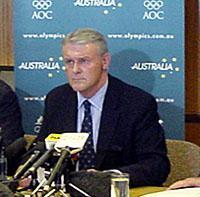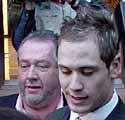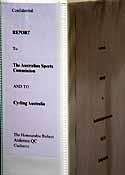Cycling News Flash for July 29, 2004Edited by Jeff Jones Dajka's spot in Athens squad faces new threatBy Gerard Knapp in Sydney
The Athens Olympics campaign of the 2002 world keirin champion, Australia's Jobie Dajka, is once again under threat following the release of a report claiming that the cyclist made "untruthful denials" to a specially appointed enquiry headed by the retired Supreme Court Justice, Robert Anderson, QC. Dajka has 24 hours to explain the alleged inconsistencies in his evidence before the Anderson inquiry, otherwise it's likely his selection to the Athens Olympics squad will be withdrawn. Waiting in the wings is the Sydney track cyclist Ben Kersten, whose separate appeal before the Court of Arbitration for Sport (CAS) was set down for today, but was subsequently delayed for another 24 hours following the statement issued on Dajka. Kersten, who is the "first reserve" for the Australian track sprint squad for Athens, has based his appeal over the selection criteria and track testing procedures employed by Cycling Australia as it decided on the final position in the track sprint squad (specifically, the lead rider in the team sprint).
While his appeal is not directly linked to the Dajka matter - as Kersten is separately challenging the eventual selection of Sean Eadie for the spot in Australia's team sprint trio - observers interpreted the 24-hour delay on his hearing as an indication that Dajka's fate may be sealed. The 22 year-old sprinter from Adelaide, South Australia, is currently training in Germany with other members of the Australian track sprint squad. Dajka will be interviewed today by a representative from the Australian Olympic Committee, Craig Phillips, who left Sydney yesterday to grill the young sprinter. Nonetheless, key Australian sports executives told a packed press conference in Sydney today that until Dajka had the opportunity to explain the answers he gave to the Anderson inquiry, he was still on the Australian Olympic team. "There is no pre-judgment of this; it will depend on Craig Phillips' judgment and report," said Simon Rofe, in-house lawyer at the AOC. "If he is able to satisfy, principally Craig Phillips and John Coates (president of the AOC), that he was truthful to Mr Anderson, then yes, he could remain in the team." However, further DNA testing of injecting paraphernalia found in the home-made 'sharps bucket - discovered in the room of suspended track sprinter Mark French at the Del Monte facility of the Australian Institute of Sport (AIS) in Adelaide last December - revealed an identical DNA profile to that of Dajka. Earlier, Dajka had denied to the Anderson inquiry that he had ever used French's room for injections. Performing for the cameras
To use a sporting cliché, it was all happening at Chifley Towers, a distinctive skyscraper that overlooks Sydney Harbour, on a sparkling winter's afternoon. The landmark is home to the plush offices on the 27th floor of the Australian Olympic Committee, as well as the law firm Allens Arthur Robinson, which hosts sessions of the Court of Arbitration for Sport (CAS) in one of its meeting rooms. After the first press conference jointly held by the AOC (represented by Simon Rofe, in-house counsel), Cycling Australia (represented by Graham Fredericks, CEO) and the Australian Sports Commission (represented by Peter Bartels, chairman), the assembled media only had to take the lift down and set up again for an impromptu press conference by Ben Kersten, who'd had his appeal before CAS delayed for another 24 hours due to the latest developments concerning Jobie Dajka. Up on the 27th floor, a prepared statement was read to the assembled media by Bartels, himself a former champion track cyclist who went on to become the CEO of a major retail chain in Australia. Bartels said, "The Addendum records Mr Anderson's opinion that this (new) DNA evidence does not support Dajka's complete denial that he ever injected in that (French's) room. Mr Anderson states that this DNA evidence clearly shows that on some occasions Dajka did inject himself in that room." While Mr Anderson says in his report there is insufficient evidence to determine what product Dajka did inject, and therefore he faces no doping charge, it seems that telling fibs to the retired judge rates highly on the disciplinary scale. "Mr Anderson's finding in this regard is very serious," Bartels said. "Dajka's statements to Mr Anderson were made in the course of a formal independent investigation into allegations of doping. There is hardly a more serious subject for sport. "For this reason, the responses of athletes to questioning on behalf of the sports authorities is critical. Any suggestion that athletes have not told the full truth raises important and critical issues regarding their suitability to represent Australia and to receive financial and other support from the Australian Government and their national sporting organisation." While the executives at the press conference were repeatedly questioned about Dajka's fate, none would infer that he was on the next plane home until he'd had a good chance to explain himself. "The fact is we will have to be satisfied that by his actions he has brought himself, his sport, the team and the AOC into public disrepute or censure," said the AOC's counsellor. "At this point in time, Dajka has not had an opportunity to respond to the claims he was untruthful to Mr Anderson. We cannot judge it, and judge his position and continued membership of the (Australian Olympic) team until he had that opportunity to respond," he continued. Asked if misleading an inquiry is serious enough to bring the sport into disrepute, and therefore be dropped from the Athens squad, Rofe would only say: "After he's had an opportunity to respond to it, that could be the outcome. Yes." Dajka's fate should be known by tomorrow. Selective leaks or reporting designed to defame?Comment by Gerard Knapp
The Anderson Report - issued on July 9 - and the most recent Addendum released today, are both available as a single downloadable PDF from the Australian government Web site. (See: www.dcita.gov.au/download/0,2720,4_119629,00.pdf) Together, they make for interesting reading, particularly the Addendum, which includes the results of further DNA testing of all items found in French's 'sharps bucket'. Significantly, the July 9 report had been leaked to some Australian media outlets prior to it being tabled in the Australian Senate today. It is clear that the excerpts either selectively leaked or reported from the entire document were seemingly designed to defame and damage the reputations of as many cyclists as possible. Cyclists who'd clearly shown it was physically impossible for them to have taken part in the alleged activities were repeatedly named in some media outlets, even those that were presumably in possession of the July 9 report. The latest Addendum issues a scathing condemnation of most of Mark French's allegations. However, the damage had been done as television programs and newspapers had staged "recreations" of the alleged activities, naming the cyclists, only for DNA evidence to show his allegations were "implausible." Most importantly - and away from the media's ludicrous protesting over the use of needles to inject vitamins - the latest DNA evidence does narrow down the principal issue that fuelled this controversy: who used the equine growth hormone? Among the used syringes, swabs and phials in French's home-made sharps bucket were 13 empty ampoules of equine growth hormone. It has been the inability of all three inquiries into the 'French affair' to determine who used the eGH that has given the matter its legs. In his Addendum, Mr Anderson determines, "That the DNA profiles of Mr French and Mr Dajka were found on EquiGen does not necessarily prove that either of them handled the phial in question. It is quite possible that DNA material passed on to the phial from another object such as a tissue, bandaid or infusion set." The Addendum was completed almost 20 days after the July 9 report due to other work. There was a police investigation into a South Australian veterinary surgeon and former top level cyclist, Dr John Katakasi, who was exonerated of any involvement with the eGH found in French's sharps bucket. However, earlier reports had tried to link Dr Katakasi to the affair but it seems a fabrication of circumstantial factors. The doctor did race a bicycle, knew Jobie Dajka (but claimed to have last spoken to the Dajka family in 2001) and being a vet who has purchased equine growth hormone. The other major work to be completed was further DNA testing, as the retired judge ordered that everything in French's sharps bucket should be tested "out of fairness to Mr French." "In summary, a total of 230 items of injection paraphernalia have now been tested and 79 DNA profiles have been obtained from 78 articles. These 79 profiles are of only two people only, they being Mr Dajka and an 'unknown person', obviously Mr French," said Mr Anderson in his report. (French refused to provide a DNA sample to the inquiry, although all other cyclists named by French did provide samples.) "Overall, Mr Dajka contributed DNA to only nine of the 78 articles which have yielded DNA profiles. Mr French contributed DNA to 70 of the 78 articles which yielded DNA profiles. "Neither Mr (Sean) Eadie nor Mr (Shane) Kelly was found to have contributed any DNA to any item, i.e. any of the total of 230 items which have now been tested," Mr Anderson said. The two other cyclists named by French, Graeme Brown and Brett Lancaster, were shown to have never been in Adelaide at the time of the alleged injecting sessions in what the media dubbed "the AIS shooting gallery." Still, there could be more to be released, as the appendices to the Anderson Report and the Addendum were not tabled in the Australian Parliament today. Bartels said, "The Minister did not table in the Senate the appendices to the Anderson Report and its Addendum. The Australian Sports Commission, the Australian Olympic Committee and Cycling Australia understand that legal constraints and parliamentary rules may limit what the Minister may table in Parliament, but prefer that the entire Report, including all its appendices, be tabled as soon as is practicable." Cyclingnews' coverage of the Australian doping allegations
Growth hormone test is goAfter over a decade of promises, a test for the detection of human growth hormone will finally be introduced at the Olympic Games in Athens this month. The test, developed at Southampton University in southern England and with collaboration from laboratories in Germany, Australia and the U.S.A, will be performed on athletes' urine and blood samples. The initial analysis of the samples (to be done in Athens) will show if an athlete has taken HGH in the past 36 hours. However, a second analysis will then be performed in England which has a detection range of up to 84 days. "Up until now we've never had a test reliable enough that we were prepared to use," said World Anti-Doping Agency chief Dick Pound. Growth hormone has been banned since 1989 but has been undetectable for the past 15 years. It stimulates muscle and bone growth, and is reportedly used as a recovery drug for athletes under extended periods of stress. In addition to the new growth hormone test, WADA will also be implementing a new anti-doping database in 2005. Called the Anti-Doping Administration and Management System (ADAMS), the system will help with the implementation of the unified anti-doping code as well as being a repository of information about the whereabouts of athletes for the purposes of out of competition tests. The database will contain anti-doping information about testing and approved therapeutic exemptions.
(All rights reserved/Copyright Knapp Communications Pty Limited 2004) |

|
January 2009 |
Recently on Cyclingnews.com |




